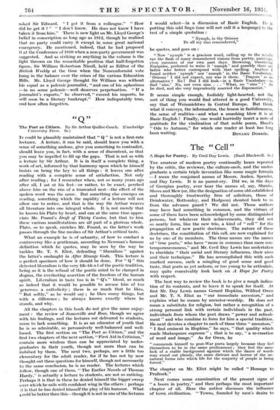ec Q ,› IT could be plausibly maintained that " Q
" is not a first-rate lecturer. A lecture, it can be said, should leave you with a sense of something undone, give you something to contradict, should leave you, in fact, with a sense of discontent, so that you may be impelled to fill up the gaps. That is not so with a lecture by Sir Arthur. It is in itself a complete thing, a work of art, informed by that harmony upon which he himself insists on being the key to all thing : -it leaves one after reading with a complete sense of satisfaction. Not only after reading ; for I remember when, not so many years ago after all, 1 sat at his feet—or rather, to be exact, perched above him on the rim of a truncated nest—the effect of the spoken word was the same. But something else' emerges on reading, something which the rapidity of a lecture will not allow one to notice, and that is the way Sir Arthur weaves all literature into one integral whole. It is not merely that he knows his Plato by heart, and can at the same time appre- ciate Mr. Pound's Draft of Thirty Cantos, but that to him these various manifestations are all part of a glorious whole. Plato, so to speak, enriches Mr. Pound, as the latter's work passes through the fine meshes of Sir Arthur's critical taste.
What an example he is of urbanity, of how to conduct a controversy like a gentleman, according to Newman's famous definition which he quotes, may be seen by the way he tackles Mr. T. S. Eliot, defending " liberalism " against the latter's onslaught in After Strange Gods. This lecture is a perfect specimen of how it should be done. For " Q " this detested liberalism is the very life-blcol of the poetic tradition, being as it is the refusal of the poetic mind to be clamped in dogma, the everlasting assertion of the freedom of the human spirit. Liberalism in taste too is in " Q's " blood, so much so indeed that it would be possible to accuse him of too 'generous a catholicity ; there is so much that he likes. " But softly," as he would say ; he likes many things, but with a difference ; he always knows exactly where he stands, and why.
All the chapters in this book do not give the same enjoy- ment : the review of Somerville and Ross, though we agree with his findings, and the lectures not delivered to students, seem to lack something. It is as an educator of youth that he is so admirable, so persuasively well-balanced and well- based. The first section on "The Poet as Citizen," and the first two chapters of the next section, "First Aid in Criticism," contain more wisdom than can be appreciated by under- graduates in their youth, though not more than can be imbibed by them. The next two, perhaps, are ' a little too elementary for the adult reader, for if he has not by now thought out these questions for himself, though not necessarily to the same conclusion, he is no reader. The lectures which follow, though one of them, " The Earlier Novels of Thomas Hardy," is actually a lecture to students, are not so enticing. Perhaps it is that in these he denied himself the bigger sweep Over which he sails with confident wing in the others : perhaps it is that he has denied himself the play of his humour. What could be better than this—thou& it is'not in one of the lectures I would select—in a discussion of Basic English. lie is putting this odd lingo (one will not all it a language) to the test of a simple quotation :
" Nymph, in thy Orisons • Be all my sins remembered," he quotes, and goes on :
" Now ' nymph ' is a gracious word, calling up to the mind's eye the flash of many remembered visions from poetry, paintings, even surmises of our own past days. Browning, translating Euripides, preferred to write it numph ' andpossibly there are ladies who better correspond with that spelling. Anyhow I found neither, ' nymph' nor munph ' in- the Basic Vocabulary. Orisons ' I did not expect, nor was it there. Prayers ' as an alternative ? No I But I' did look—in a Basle Vocabulary—to find sins.' No, not even sins. . . • '.What, no " sins ' ? So he died, and she very imprudently married the Esperantist."
It seems simple enough, foolishly light-hearted, not the sort of thing yott would find uttered in a good University, say that of Weissnichtwo in Central Europe. But think what it conveys, the information, the lesson in fastidiousness, the sense of realities—and what a smashing blow it is at Basic English ! Finally, one would hurriedly insert a note of gratitude for the vindication of -that noble poem, Hood's " Ode to Autumn," for which one reader at least has long been waiting.
BONAMY DOBICEE.






































 Previous page
Previous page